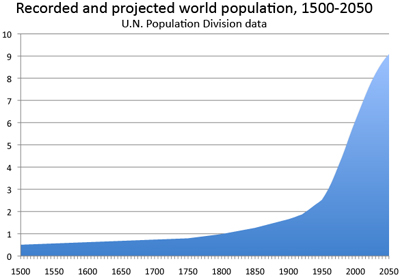Continued focus on economic growth will doom the planet
mongabay.com
October 16, 2008
An economy that focuses on economic growth above all else will lead to "disaster", argues a series of editorials published in this week's issue of New Scientist magazine.
Citing the current financial crisis, where governments have signaled their fear of anything that threatens growth by pouring hundreds of billions of dollars into failing banks and financial institutions, a group of economists question the logic of an economic system built on the assumption of growth based on continued exploitation of Earth's finite resources.
"The size of the Earth as a whole is fixed. Neither the surface nor the mass of the planet is growing or shrinking. The same is true for energy budgets: the amount absorbed by the Earth is equal to the amount it radiates. The overall size of the system – the amount of water, land, air, minerals and other resources present on the planet we live on – is fixed," writes Herman Daly, an economist considered "the farther of ecological economics".
 Past and projected world population, 1500-2050 |
"The most important change on Earth in recent times has been the enormous growth of the economy, which has taken over an ever greater share of the planet's resources," he continues. "Our economy is now reaching the point where it is outstripping Earth's ability to sustain it. Resources are running out and waste sinks are becoming full. The remaining natural world can no longer support the existing economy, much less one that continues to expand."
Daly says that as long as the economic system "is based on chasing economic growth above all else, we are heading for environmental, and economic,
disaster." Staving off disaster will require a switch from "quantitative growth to qualitative development" to a 'steady-state' economy whereby "the value of goods produced can still increase, for example through technological innovation or better distribution, but the physical scale of our economy must be kept at a level the planet is able to sustain."
He says that while the transformation to a steady-state economy may be difficult to fathom after 200 years of a growth-focused economy, it “it does not have to mean freezing in the dark under a communist tyranny.”
Daly's commentary is accompanied by a pieces by Tim Jackson, adviser to the UK government on sustainable development; Gus Speth, former environmental adviser to President Jimmy Carter and co-founder of the Natural Resources Defense Council; Susan George, a liberal academic; Andrew Simms, policy director of the London-based New Economics Foundation; David Suzuki, a sustainability guru; and Kate Soper, an environmental philosopher from London Metropolitan University.
Jackson takes a deep look at the implications of economic growth in a world where population is expected to reach 9 billion by mid century. He says that unless technological innovation decreases the environmental impact of consumption dramatically (i.e. by greater than ten-fold), the planet will not have the resources or ecological capacity to support 9 billion people. The solution in his mind — reducing consumption and thereby moving away from the conventional growth model — is presently toxic in the minds of politicians and the broader public.
 Dow Jones Industrial Average, Oct 1, 1928-Oct 15, 2008 Dow Jones Industrial Average, Oct 1, 1928-Oct 15, 2008
|
"This is the logic of free-market capitalism: the economy must grow continuously or face an unpalatable collapse," he writes. "With the
environmental situation reaching crisis point, however, it is time to stop pretending that mindlessly chasing economic growth is compatible with sustainability. We need something more robust than a comfort blanket to protect us from the damage we are wreaking on the planet. Figuring out an alternative to this doomed model is now a priority before a global recession, an unstable climate, or a combination of the two forces itself upon us."
Speth and George build on Jackson and Daly, arguing that environmentalists' new emphasis on designing and selling "green" products will be no match for unbridled capitalism and that it will take a deeper philosophical shift lead by governments to avoid ecological collapse. Like Daly and Jackson, they imply that governments will need to abandon the pursuit of economic growth as a guiding principle. Simms says the shift can be made easier by acknowledging the idea that economic growth is only way to improve the lot of the poor is a "myth". In developing his argument he notes that little of the world's economic growth since the 1980s have done to the world's poor. Soper adds that "curbing our addiction to work and profits would in many ways improve our lives", while Suzuki explains how he inspires business leaders and politicians to change their thinking.
Read more in the special section in the October 18 issue of New Scientist.














